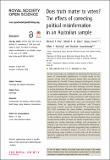Does truth matter to voters? The effects of correcting political misinformation in an Australian sample
Author(s)
Aird, Michael J.; Ecker, Ullrich K. H.; Lewandowsky, Stephan; Swire-Thompson, Briony; Berinsky, Adam
Downloadrsos.180593.pdf (533.1Kb)
PUBLISHER_CC
Publisher with Creative Commons License
Creative Commons Attribution
Terms of use
Metadata
Show full item recordAbstract
In the 'post-truth era', political fact-checking has become an issue of considerable significance. A recent study in the context of the 2016 US election found that fact-checks of statements by Donald Trump changed participants' beliefs about those statements-regardless of whether participants supported Trump-but not their feelings towards Trump or voting intentions. However, the study balanced corrections of inaccurate statements with an equal number of affirmations of accurate statements. Therefore, the null effect of fact-checks on participants' voting intentions and feelings may have arisen because of this artificially created balance. Moreover, Trump's statements were not contrasted with statements from an opposing politician, and Trump's perceived veracity was not measured. The present study (N = 370) examined the issue further, manipulating the ratio of corrections to affirmations, and using Australian politicians (and Australian participants) from both sides of the political spectrum. We hypothesized that fact-checks would correct beliefs and that fact-checks would affect voters' support (i.e. voting intentions, feelings and perceptions of veracity), but only when corrections outnumbered affirmations. Both hypotheses were supported, suggesting that a politician's veracity does sometimes matter to voters. The effects of fact-checking were similar on both sides of the political spectrum, suggesting little motivated reasoning in the processing of fact-checks. Keywords: voting behaviour; fact-checking; political attitudes; misconceptions; misinformation; belief change
Date issued
2018-12Department
Massachusetts Institute of Technology. Department of Political ScienceJournal
Royal Society Open Science
Publisher
Royal Society
Citation
Aird, Michael J. et al. “Does Truth Matter to Voters? The Effects of Correcting Political Misinformation in an Australian Sample.” Royal Society Open Science 5, 12 (December 2018): 180593 © 2018 The Author(s)
Version: Final published version
ISSN
2054-5703
2054-5703